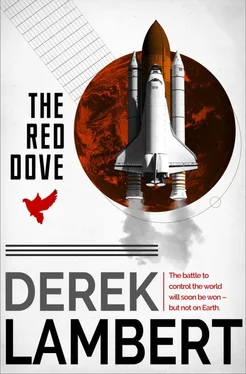Replacements were brought by waitresses in black and white uniforms.
As the vodka took hold, moods changed and the chatter rose a few decibels. A weeping poet toasted Love; two Uzbeks retired outside to fight over Anna, the bridesmaid; glasses smashed; a man who looked like a prizefighter found his baritone voice deep in his barrel chest and aired it, singing of tragedy with unfettered relish. As one, the guests mourned and celebrated their lot.
Talin and Sonya left at 1 p.m. to catch a plane to Sochi. No one, except Sedov and Massey, seemed to be aware of their departure. They looked for Anna but she had locked herself in a bathroom with the baritone while her other two suitors slugged it out on the sidewalk.
In Sochi, Talin and Sonya found another Russia. In the late afternoon they strolled in the warm sunshine along the esplanade with its flights of white steps and pergolas, gazed over the cypress-speared forest sweeping down to the shore from the snow-capped peak of Mount Elbrus, Europe’s highest mountain, watched the hydrofoils skimming the green waters of the Black Sea, smelled blossom on the air. In the evening the streets were alive with guitar music.
That night they went to bed exhausted and didn’t make love.
On successive nights they made up for the lapse.
Daily they grew healthier among Sochi’s spas, solariums, clinics, sanatoriums and rest-homes. Every year 500,000 tourists visit Sochi to take the air, the waters, the tonics. In the cafés the topic is health, good or bad.
They strolled along the beaches, climbed the mountain road to Dagomys, capital of Russian tea, took a coach to a grove fifteen miles from the centre of Sochi to look at yew and box trees reputedly 800 years old; ate trout from a hatchery filled with moss-green water.
Occasionally Talin became aware that a thin man wearing a fawn suit seemed to be haunting them. Following them? Smiling, Talin derided himself: Leninsk security had got to him. There must be a thousand men wearing fawn suits in Sochi.
On Friday, 20 December, they flew back to Moscow.
On the same Friday Boris Rybak got drunk on the Ukrainian circuit in Moscow.
He was not alone in his drinking, Friday being Moscow’s prime night for boozing, closely followed by Saturday and Sunday. Monday was the prime day for absenteeism.
Rybak was always puzzled by the reasons put forward by sociologists for Soviet drinking. Failure to complete their work output, escape from responsibility, the cold, etcetera.
Rybak drank to get drunk.
And, like most Russians, he drank vodka, the libation, liberation and hard currency of the people. If you wanted a job done properly pay the carpenter or plumber with a litre of firewater.
Rybak drank mostly in the homes of Ukrainians where, as the vodka unleashed their tongues, the toasts grew louder and the language of their land, banished by Stalin, lived again.
By and large Rybak was an amiable drunk, disciplined enough, even when carrying half a litre of vodka in his belly, not to be indiscreet about his OUN activities. His one weakness was, paradoxically, his strength; when, after recalling his Olympic endeavours, he demonstrated that strength, a cord of restraint sometimes snapped inside him, particularly if, because of his girth and blubber, his power was questioned. Once at a party a lithe, olive-skinned Armenian who taught judo at night classes remarked: ‘What is the good of muscles if they’ve melted?’ and, with a shrug, accepted Rybak’s challenge to fight. The Armenian swayed at Rybak, trying to use his weight and strength to his own advantage; but whatever he did Rybak just came at him until he was trapped in the corner of the room. Rybak encircled him with his arms; to the onlookers it looked like a friendly embrace, until they heard the Armenian’s ribs crack.
Tonight Rybak resolved not to get excessively, Friday-night drunk because the following day he had to make contact with an American named Massey.
But vodka is a sly drink. Down the throat it slides to ignite small fires which the drinker believes he has extinguished with mineral water and zakuski. What, in fact, he has done is induce internal combustion and it only needs a few breaths of fresh air to set the flames roaring.
Rybak visited four homes, using his sophisticated electrician’s skills at each to detect any bugs before the anti-Soviet toasts became too explicit. On the first three occasions he navigated his exit into the sharp-toothed night reasonably well. It was the fourth visit, to a wooden izba in the Arbat, that was his undoing.
The old cottage with its incandescent stove was built for historical outrage. After the first two litres of vodka the hosts and guests, all Kievans, stormed down their city’s Kreshchatik Street beneath the chestnut trees resurrecting their heritage prior to the October Revolution.
Glasses were hurled at the glowing stove.
Then Rybak demonstrated the latent strength of the Ukraine by lifting above his head a table bearing three guests. He issued a spate of challenges but, remembering the fate of the Armenian who even now breathed with pain, no one took them up.
Out into the street he finally strode, all twenty stone of him. He sucked down the crackling air and, whoosh, the fires inside him were rekindled. Their ferocity spun him round and, to escape them, he took cover in the gutter where, five minutes later, the militia’s vodka patrol shovelled him up and, with considerable effort, piled him into the back of a van and carted him off with the other drunks to a sobering-up station.
He came to gazing at Christ.
The sobering-up station was part of a derelict monastery. Recently the Soviet authorities had been renovating it to prove their respect for religion. Fifty years of dirt, rust and pigeon droppings had been scraped away, blue cupolas had been polished, crosses burnished.
Above the entrance the face of Christ was re-emerging in mosaic pebbles and some of the staff of the sobering-up station asserted that its effect on the drunks was more potent than the usual jets of ice-cold water. To an extent this was true because the boozers believed the Day of Judgement had arrived and immediately began to dry out.
Not so Rybak. Seeing Christ peering down at him, he decided he was reproaching him about his gross appearance and challenged him to a bout of wrestling.
Two attendants turned the water hose on him, then tried to strap him naked on an iron bed, but he resisted. A needle slid into his buttock. He continued to struggle for a few seconds before collapsing on the bed, a great mattress of flesh. They strapped him down and threw two grey blankets over him.
Punctiliously they entered him in their records. ‘The eighth time this year,’ one of them noted. ‘I wish he’d piss off back to Kiev and get drunk there.’
The following morning Rybak departed with the considerable dignity of the very fat and caught a bus to his rendezvous with Massey in one of the establishments where Russians, like the British in their pubs, debate the human condition – the banya, the bathhouse.
Phase 3: First hit, with devastating revelation, preferably personal.
Massey awoke from a nightmare. When he had made his devastating revelation Talin had produced a razor, slit his own throat and, smiling, said: ‘Pray continue.’
Massey felt the sheets. They were wringing wet. Blood? No, sweat. He glanced at the illuminated dial of his wristwatch. 6 a.m. Six hours before he was due to make contact with a Ukrainian named Rybak.
He switched on the bedside lamp. There hadn’t been a vacancy in the military billets in Moscow and he had been put back in his old room, 2604, in the Ukraina Hotel.
He swung himself out of bed and padded round the room. On the glass-topped table lay a magazine published in English for visitors. He flicked the pages. And there were Nicolay Talin and Sonya Bragina staring at him, Talin with his fair hair swept back from his bold features, Sonya smiling up at him.
Читать дальше
Конец ознакомительного отрывка
Купить книгу












